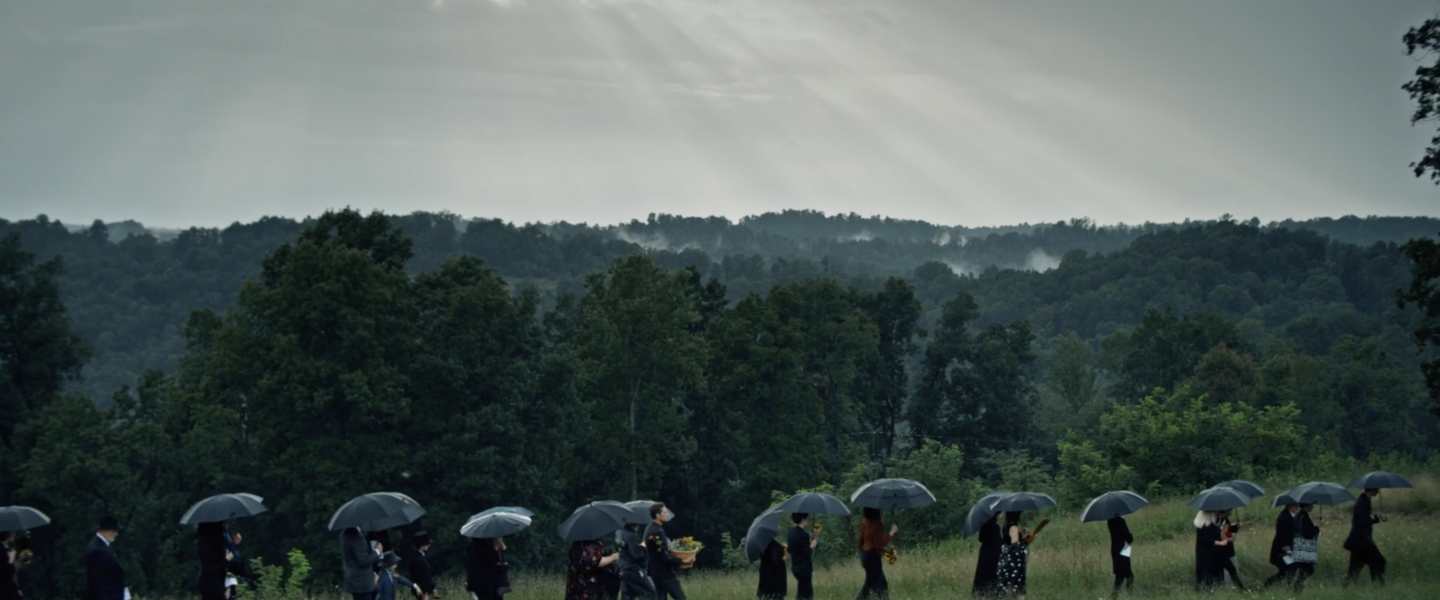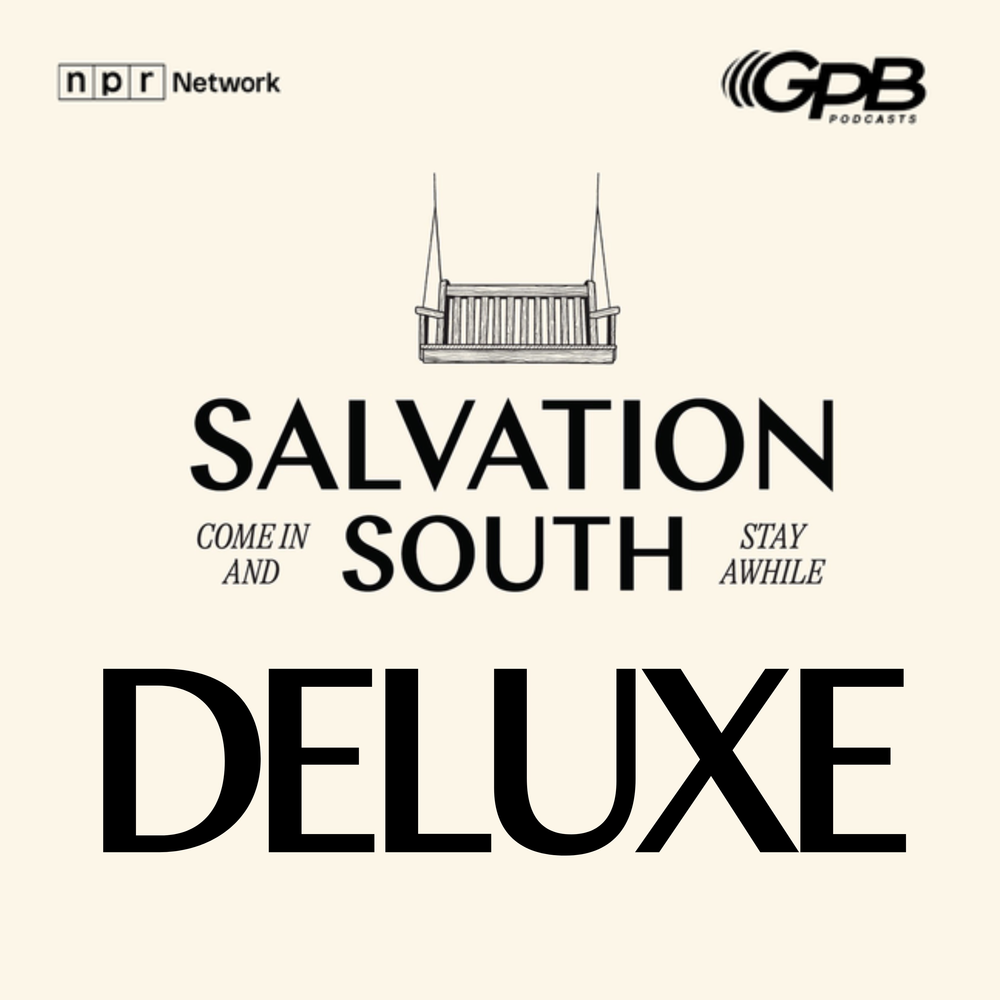
Section Branding
Header Content
Deluxe: The Death of a King - How "King Coal" Explores Grief Over a Lost Industry
Primary Content
In this episode of Salvation South Deluxe: Native Appalachian documentary filmmaker Elaine McMillion Sheldon and others talk to Chuck about "King Coal," a new documentary which uses unconventional storytelling techniques to explore mountain folks' complicated relationship with the dying coal industry.

TRANSCRIPT:
Elaine McMillion Sheldon (from "King Coal"): I don't remember the day I learned I lived under King Coal. I remember going on field trips to the mines. I remember humming along to "Coal Miner's Daughter." Welling up with pride. Feeling Loretta had written it just for me. I remember learning that if I said anything bad about the King, I was betraying my loved ones.
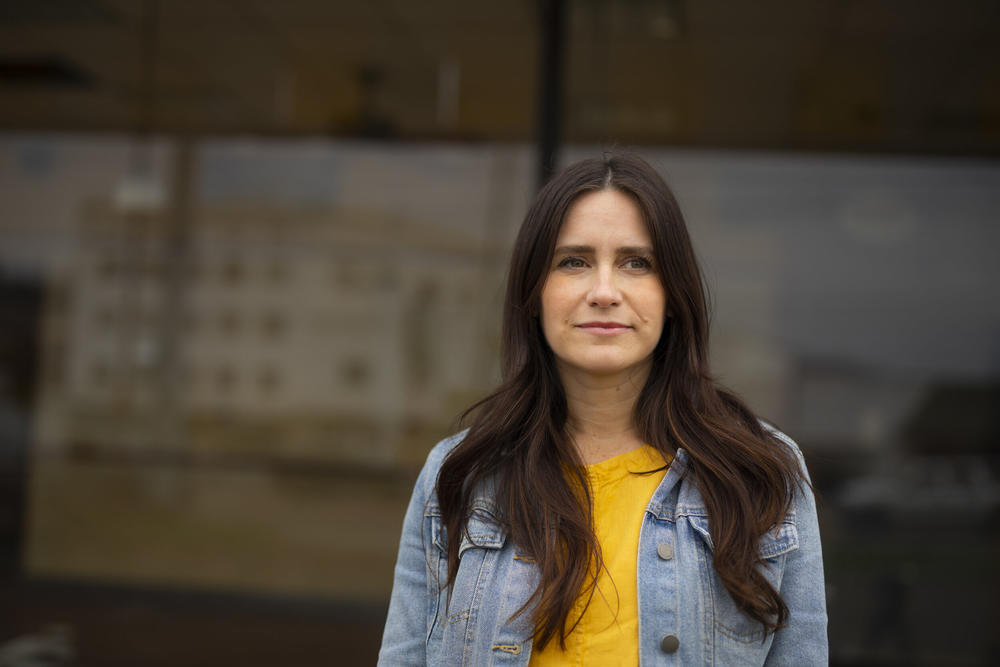
Chuck Reece: The words you just heard were written and spoken by Elaine McMillion Sheldon. Elaine is literally a coal miner's daughter and a coal miner's granddaughter. She is also an Oscar-nominated documentary filmmaker. She wrote those words for her latest movie, which is called King Coal. And King Coal is not the kind of documentary we're all used to watching, where the filmmakers go out and interview people and collect their stories and collect the facts and edit them all together into a film. Many filmmakers working with the same subject matter would have collected the data on the long, slow decline of the American coal mining industry. They would talk about its affects on the generations of families who made their way in this world by bringing that particular fossil fuel up out of the ground. King Coal, though, is a horse of a different color. It is instead a deeply personal and painful goodbye to coal culture, to the pride that miners and their families took in powering this nation, and to their realization that they had lived for well over a century as subjects under the harsh rule of a larger than life itself figure named King Coal.
Today on Salvation South Deluxe, we're going to learn from Elaine and a few others exactly what it's like to live in a part of America that was ruled by a king, and then to have to lay that king to rest.
[THEME MUSIC]
I'm Chuck Reece and welcome to Salvation South Deluxe, a series of in-depth pieces that we add to our regular podcast feed, hoping to unravel the untold stories of the Southern experience by letting you hear the authentic voices that make this region truly unique.
Trevor Noah (from The Daily Show): Please welcome Elaine McMillion Sheldon.
Chuck Reece: I have known Elaine McMillion Sheldon and her work since 2015.
Elaine McMillion Sheldon (from Oscars interview): Our short film Heroin(e) follows three women on the frontlines of the opioid crisis in Huntington, West Virginia.
Trevor Noah (from The Daily Show): This is one of the most heart-wrenching stories that I think America is waking up to, all over the country: the opioid epidemic.
Chuck Reece: After Donald Trump was elected president, TV news operations started calling Elaine, asking her to film interviews with coal miners who voted for Trump or miners who hadn't voted for Trump.
Elaine McMillion Sheldon: It became really, something I was aware of that people just like were getting a corner of the story, but they weren't really understanding the cultural side of it. I made a film called Betting on Trump about miners who voted for Trump, made a film about black lung, and made a film about the environment. All for people. All commissioned work. And that work was always, you know, controlled and edited by people other than me at the end result, and I always felt it was just missing the sort of ground-level anxiety and soul. And so in 2018, Molly Born and I — I asked Molly if she wanted to sort of go on this adventure with me. I didn't know what it meant, but I wanted to document the the culture.
Chuck Reece: Molly Born, like Elaine, was a child of West Virginia, a veteran journalist who had covered the state for many years. All her life, she had seen how the coal industry had defined not just the economy of West Virginia, but also its culture.
Molly Born: And the film began as an observational documentary. We were filming these coal-related cultural scenes. So we filmed coal shoveling contests. We filmed at one of those coal fairs, like sort of where they have social studies projects and the like. We filmed educators in the classroom. These, these cultural expressions around coal. And that's what the film began. The idea was that it would be a verité, observational documentary.
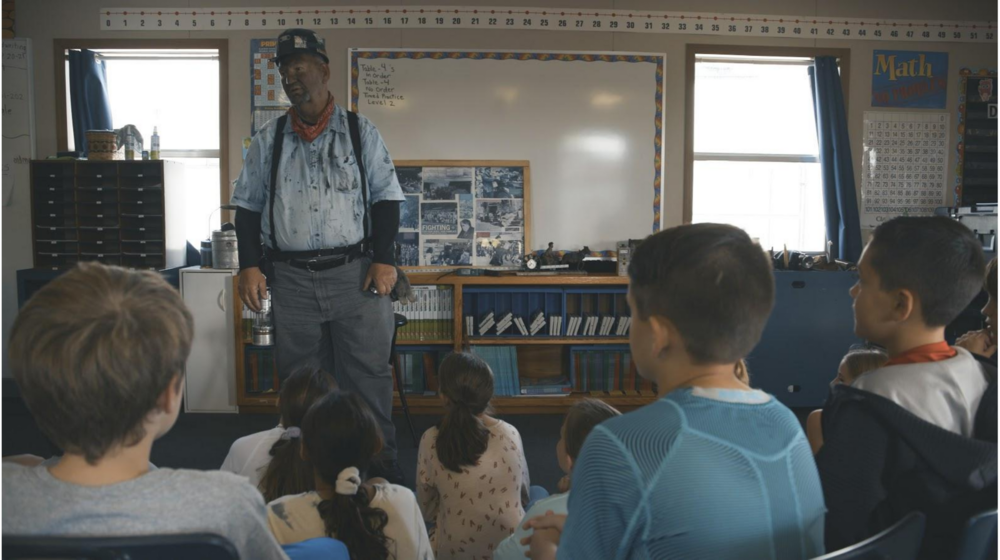
Chuck Reece: But the more such scenes they filmed, the more they both realized that a traditional documentary could never speak to the deep emotional connections they felt to the mining industry, which had fed their families for generations. And that's when Elaine remembered the words of a Scotsman named John Grierson, who a century ago was a pioneer of documentary filmmaking.
Elaine McMillion Sheldon: John Grierson, called documentary "the creative treatment of actuality," which I love, because I think that allows the expansiveness of sort of creative nonfiction to make its way in, and how true stories, how they're told, how it actually matters in the way that we feel empathy with people in their stories.
Chuck Reece: Elaine realized that to put real empathy into her documentary, she would need to introduce a character. A character she could not interview, a character whose face it was impossible to put on the screen.
Elaine McMillion Sheldon: I wanted to make a film that King Coal was the character. You know that this is a sort of like being that we don't see, but we feel. Your character is usually a person you see on screen. So how do you make this character, someone that is in fact not even real, feel real enough to be a character that pulls you through. And so I just took a step back and looked at the limitations of the observational form. And so the film, for me became more about documenting what could be and the things that we couldn't see, but we actually felt.
Chuck Reece: And that, dear listeners, is how "King Coal" became a documentary film unlike any other you're ever likely to see — a film that blends elements of fiction and fable into the facts of life in West Virginian coal country. Unlike traditional documentaries, the film does not dwell on facts and figures. Instead, it dives into the psyche and mythology of Appalachian coal country culture. Two young girls who grew up in mining families — Lainey Marsh of Hurricane, West Virginia and Gabby Wilson of Charleston — pull the narrative of the film from start to finish. We do see them in unscripted, real-life activities, but in other scenes their expressive dancing and curiosity advance the story as sometimes only children can do. We see these girls, both in their teens, dancing in the black dust alongside railroad tracks where the coal trains run. Elaine says she simply set the scenes for Lainey and Gabby, and then let them do whatever they felt like doing in front of the camera.

Elaine McMillion Sheldon: I had no clue what I wanted them to do. I just knew I wanted these moments. I remember what it was like to be a kid, and I was jumping on a trampoline beside a train track and my feet and knees were covered in coal dirt. Right? So like coal dirt was built into every childhood memory of mine, and I wanted those experiences to be part of them, like I wanted them going to the dinky little fairs that I grew up going to that are all funded by the coal that's pulled out of the mountains in that town. And so we just started letting them be the girls they were in those moments, and anything that made it in the film ended up just being what things that they said.
One of my favorite moments in the film is when Lainey looks to Gabby and on the homework it says, is "is coal important to your family?"
Lainey Marsh (from "King Coal") Is coal important to your family?
Elaine McMillion Sheldon: Gabby's like...
Gabby Wilson: I don't know.
Elaine McMillion Sheldon: She genuinely, at that stage of filmmaking, didn't know that her great-grandpa was a miner. She learned that the process of making the film. And Lainey, in that moment...
Gabby Wilson (from "King Coal"): Is it to your family?
Lainey Marsh: Yes.
Elaine McMillion Sheldon: Like it's an immediate, no hesitation, "yes. Coal is important to my family." And Lainey, in some ways is me. Like a normal kid is not thinking critically about what their parents do for work. That's not a concern of ours. Gabby represents the part of me that wanted to leave and is, like, struggling with this, sort of like, "Am I from here, of this place, but also of other places?" And how to be rooted. And she — I think she feels that pull more than Lainey. And so they both feel like versions of me, which is also versions of other kids in Appalachia who feel this sort of tension of leaving and staying, which ultimately is the story of King Coal, right?
Chuck Reece: Which makes the story of King Coal a universal Southern story. In every part of our region, young people struggle with the basic question: Should I stay or should I go? We might see the places that raised us as having limited opportunities or ways of looking at the world that are different from our own. Most of us do love where we came from. Most of us appreciate that our feet are stained with coal dust or red clay or coastal sand, whether it's literal or figurative. But in the home country of West Virginia, and eastern Kentucky, "the stay or go question" carries the weight of a global economic fact. The world is turning away from fossil fuels. The disappearance of King Coal is very real. Given how often we've heard politicians talk about coal over the last few years, it's eye-opening to stare this one fact in the face: American employment in coal mining actually peaked 100 years ago, in the 1920s. But the hundreds of communities that did the mining are still struggling with how to rebuild their economies. To get some perspective on that, we visited Gabe Schwartzman, a professor at the University of Tennessee in Knoxville whose research focuses almost entirely on rural economic transition.

Chuck Reece: Has there ever been a rural economic transition that has posed so many challenges for so many people across such a wide geographic area as the decline of coal?
Gabe Schwartzman: Wow. That's — that's the big — that's the big question, isn't it? Coal is exceptional because it is, you know, it was such a huge employer and has been and the decline has really been decades in the making. I can't think of another one that is as place-based in our, in our modern era, right? That is as geographically defined as the decline of the coal industry, and has had such profound social and economic impacts on a pretty discrete number of communities, right? Like southern West Virginia, eastern Kentucky, southwest Virginia, parts of northeast Tennessee have been profoundly turned upside down in the last two decades, really.
Chuck Reece: Elaine remembers when she first felt her own world turning upside down.
Elaine McMillion Sheldon: I remember the day I felt like we were allowed to say, King Coal is dying because it does feel in ways like, "this religion, you just don't speak against it." And so I remember it was when Obama was president and my dad said something his his words were "the death spiral of coal." And for my dad of, you know, former miner, mining engineer who spent 30-plus years in this industry, and my brother who had just entered it, and all my cousins who still worked in it, to say that at Christmas when I was visiting, I was — it was honestly like the doors had been opened and light had been let in, and I was like, "oh, we're acknowledging this. Like we are actually talking about this right now." And what he was specifically referring to was that the power plants were aging and they were going to be updated. And so therefore there would be a natural transition away from coal. But what I was interested in was what that meant for us as a community. My dad was absolutely a company person, right? Like, I wore fanny packs that said Pittston Coal, and I carried water bottles that had coal company logos on them. I mean, I was one of those kids that would have been at the science fair reading a poem about my dad who was a miner, right? So like I, in many ways, just didn't know any other thing, and I didn't really understand. I didn't understand the global economics. I didn't understand these things, right. And I knew there was something wrong with a creek that ran orange. I knew there was something wrong with the fact that that mountain is, you know, dust is flying off of that after you see an explosion, when you're driving down, you know, towards Raleigh County and you're on the highway, sometimes you could actually see them blowing them up. And it's like, that's not right. You know that that's not in line with everything else my family's telling us to do in the world and to be in the world.
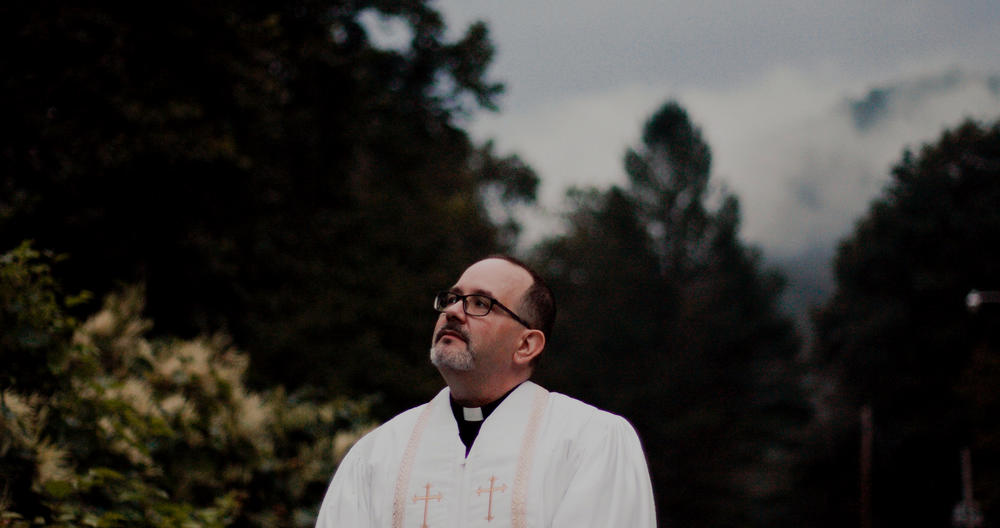
Chuck Reece: I suppose that was like the day when you get the news that the diagnosis is terminal for someone you love. You have to accept the fact that not too far down the road, you'll be going to a funeral. Which is what led Elaine to the totally-not-acceptable-in-a-documentary idea that would give her film a proper ending, that would turn it into something larger and more emotional than a normal documentary could ever be. She decided to stage a funeral for King Coal on a hilltop among the remains of an abandoned church built by a coal company in a miner's village that long ago shut down. And she asked a local Methodist preacher, the Rev. Brad Davis, to write and deliver the eulogy for Old King Coal himself. The death of King Coal was personal to Davis. Both his grandfather and great grandfather were miners who died of coal worker's pneumoconiosis. You probably know it as black lung disease. Here is a small part of Reverend Davis's eight-minute eulogy.
The Rev. Brad Davis: Old King Coal. What are we going to do? The mountains are gone, and so are you. But even so, rejoice, dear ones. Let not your hearts be troubled, my people, do not despair. Do not buy into the lie that there is nothing — that we are nothing without our King. He is not the sum total of us and our identity. There was a life here in these hills and hollers before his coming. And there shall continue to be life long after he's laid low in the hole.
Chuck Reece: Reverend Davis's sermon was an appeal to the fierce independence and pride of place held by miners and mountaineers: a reminder to them that King Coal did not define them, that instead they could define themselves.
Elaine McMillion Sheldon: Brad and I had just had this incredible conversation, sort of like theological question of putting back, you know, the coal, the entity back into the ground from which it came. Like, what did that mean from a resurrection standpoint? I mean, there was just — we just had this incredible dialogue. I said to Brad, "I've sort of seen King Coal as this dying man that we're dragging along, but he's begging us to let him go." And that was something that, like, kept coming up over and over is like this sort of idea of giving up the ghost and that he's already gone, actually. And it's — it's actually up to us to let go of that story.
Chuck Reece: Like any minister, Reverend Davis had preached a whole bunch of funerals, but never one for a figure like the king who had ruled over his home country for more than a century.
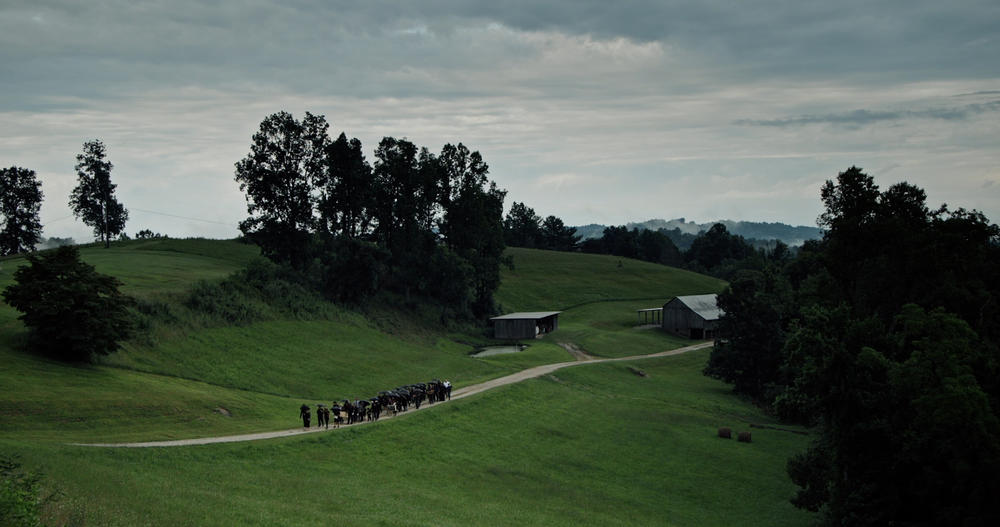
Reverend Brad Davis: In that space of, conducting a funeral and preaching a funeral, what you are doing, is proclaiming resurrection in the face of death. You are penetrating the despair to give people hope for an as yet — an unrealized future. And I think that's that's exactly what a good funeral sermon does. And that's what I was attempting to do, with, with the eulogy that I wrote for the film because, you know, in an actual eulogy or an actual funeral, you are proclaiming to those present the family and the friends that there — there will be resurrection of the individual in front of you or who, who we are honoring today. But for the film, for the eulogy for King Coal, it was a little bit different. I wasn't necessarily proclaiming the hope of resurrection for King Coal, but the hope of resurrection for our people.
Chuck Reece: In the editing room, Elaine just couldn't make Reverend Brad's entire eight-minute eulogy fit into the film, and she felt like cutting it into pieces would not do it justice. So Elaine created a short companion film called "A Eulogy for King Coal," and a few months ago, we ran it on Salvation South alongside an essay from co-producer Molly Born. Only after that did I get the chance to see King Coal in all its glory: the 78-minute feature-length finished product. The funeral scene that ends that film was unlike anything I'd ever seen on the big screen, and Elaine later told me that experiencing the actual service on that hilltop, complete with Brad's eulogy and testimonials from many people who had grown up under the reign of King Coal, was almost indescribable.
Elaine McMillion Sheldon: Some read poetry. They read, some just gave testimonies about what it was like to have a, you know, father in the mines, or what it was like to work in the mines themselves. We had a former miner there.
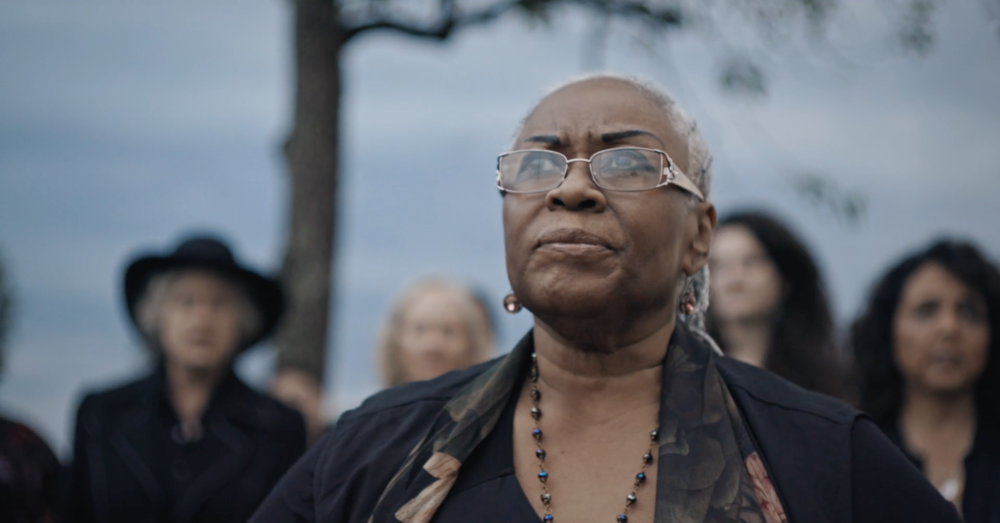
Chuck Reece: A songwriter named Sam Lee had written a funeral dirge for King Coal and a singer named Lady D, whose fans call her West Virginia's First Lady of Soul, led the whole congregation as they sang.
Lady D (from "King Coal"): Won't you lay King Coal down in the cold, cold ground.
Congregation: Beneath the linden tree.
Lady D: Shake the coal dust cloud of my funeral shroud.
Congregation: Beneath the linden tree.
Lady D: King Coal had my body, but heaven has my soul.
Congregation: Beneath the linden tree.
Elaine McMillion Sheldon: The feeling afterwards was like complete elation and joy. Like there was this — it's like there was no somberness. Like the somberness was left behind at the bottom of the hill. By the time we got to the top of the hill and lit the fire, it was like a complete freedom. And everybody felt it. And then we had food and music and it was celebratory. It's really incredible.
I couldn't believe we pulled it off. And I couldn't believe all these people actually felt this emotionally, this real moment. And it was just so freakin' meaningful and so powerful. It just taught me how to use film in a way I had never done before — going back to, like, journalism, taking you out of the center. Like, you never allow that in journalism, right? Like you would never stage this thing and allow the documentary to unfold in that staging. So freedom. That's what it felt like at the end. And I hope that people still carry that seed with them.
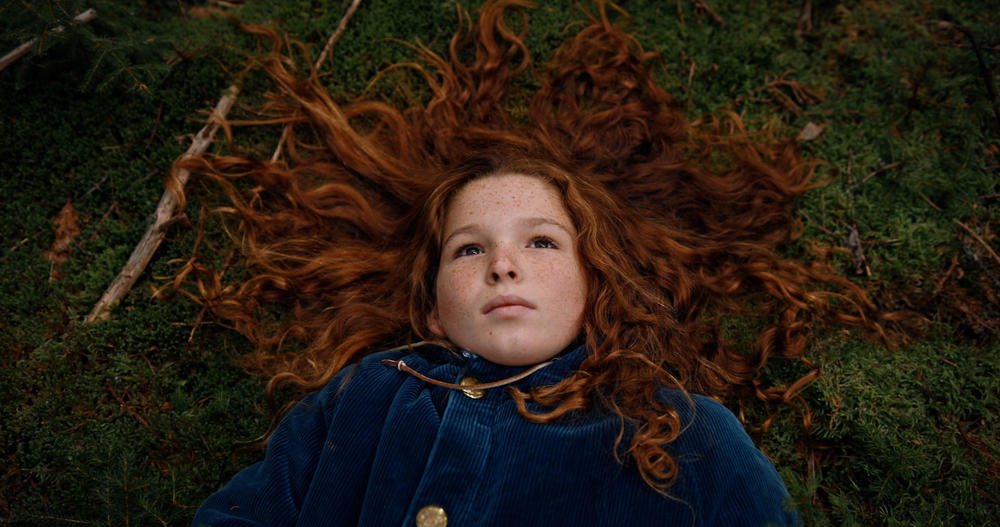
Chuck Reece: We'd like to thank Elaine McMillion Sheldon, Molly Born, the Rev. Brad Davis, Professor Gabe Schwartzman, and the good people at Drexler Films, Cottage M and Fishbowl Films for their help and cooperation in producing this episode. King Coal will be available on all streaming platforms Amazon Prime Video, Apple TV, and beyond to rent in May. The summer PBS's POV will broadcast King Coal nationwide. And POV will stream the film for free and make it available to K through 12 students. And you can request a screening in your own community and support the effort to get King Coal out in front of as many people as possible by visiting www.KingCoalFilm.com/contact. We also encourage you to visit Salvation South to watch Elaine's short film with Brad Davis, "A Eulogy for King Coal." And we posted a link in the show notes so you can do that.
You've been listening to Salvation South Deluxe, proudly produced in cooperation with Georgia Public Broadcasting and its network of 20 stations around our state. Every Friday, we add a new three-minute commentary about southern stuff to our podcast feed. And every month or so, we have longer deluxe stories, such as the one we've just told you. I'm Chuck Reece, your host and the editor in chief of Salvation South, which you can find 24/7 over at SalvationSouth.com. Our producer is the mighty Jake Cook, who also composed our theme music. GPB's senior podcast producer is Jeremy Powell. And none of this could have happened without wonderful people like GPB's Sandy Malcolm, Ellen Reinhardt and Adam Woodlief. We'll be back next month with another deluxe full-length episode of The Salvation South podcast.
----
For more on King Coal:
-
Official website
-
"A Eulogy for King Coal" on Salvation South
Salvation South editor Chuck Reece comments on Southern culture and values in a weekly segment that airs Fridays at 7:45 a.m. during Morning Edition and 4:44 p.m. during All Things Considered on GPB Radio. Salvation South Deluxe is a series of longer Salvation South episodes which tell deeper stories of the Southern experience through the unique voices that live it. You can also find them here at GPB.org/Salvation-South and wherever you get your podcasts.
